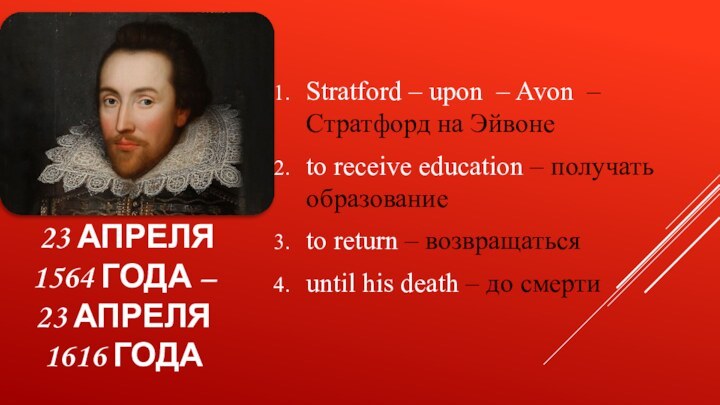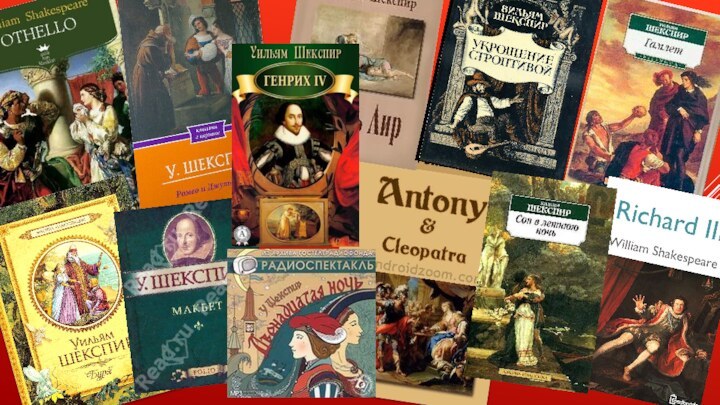Слайд 2
23 апреля 1564 года –
23 апреля
1616 года
Stratford – upon – Avon – Стратфорд на
Эйвоне
to receive education – получать образование
to return – возвращаться
until his death – до смерти
Слайд 3
Where and when was W. Shakespeare born?
Где и
когда родился
У. Шекспир?
Слайд 4
Did he receive a good education at the
Stratford grammar school?
Он получил хорошее образование в школе?
Слайд 5
At what age did he marry?
В каком возрасте
он женился?
Слайд 6
What kind of difficulties was he in when
he lived in London?
С какими трудностями он столкнулся, когда
жил в Лондоне?
Слайд 7
Till what time did Shakespeare live at “New
Place”?
До какого времени он жил в
“New Place”?
Слайд 8
Most of Shakespeare’s plays are well -known all
over the world, aren’t they?
Большинство пьес Шекспира известны во
всём мире, не так ли?
Слайд 9
How many sonnets did Shakespeare write?
Сколько всего сонетов
написал Шекспир?
Слайд 11
“To be or not to be?” – Быть
или не быть?
“What’s in a name?” – что
в имени тебе моём?
“Love all, trust a few, do wrong to none.” – Люби всех, доверяй немногим, не обижай никого.
“A fool thinks himself to be wise, but a wise man knows himself to be a fool.” – Дурак считает себя мудрым, но мудрый человек знает себя дураком.
“All the world's a stage…” – Весь мир - театр.
“God has given you one face, and you make yourself another.” – Бог дал вам одно лицо, а вы рисуете себе другое.
Слайд 12
In a rich literary heritage, left to us
by Shakespeare, sonnets have a special place. In the
90-s of the XVI century sonnet becomes the most common form of poetry in England. The first mention of Shakespeare’s sonnets we find in Meres’ works. He says about “sweet sonnets of Shakespeare which are famous among his personal friends. Shakespeare’s sonnets were published only at the beginning of XVII century, in 1609.
Слайд 13
A lot of efforts were spent to combine
his 154 sonnets in one unit. Although the whole
book of sonnets was written by Shakespeare, he didn’t write them according to the particular plan. They were poems “on occasion”, response to what happened to him, his friend, his sweetheart. They represent a lyrical diary with some problems in his notes as well as usual diaries. The origin of some sonnets is connected with strained relation ship, between his sweetheart and him, the others were written in his thoughtful hours and it is not difficult to guess that many of them are associated with real occasions.
Слайд 14
But the main content of the sonnets is
the theme of love and friendship. There are much
more sonnets devoted to his friend than poems about his sweetheart, and it distinguishes Shakespeare’s sonnets from all other sonnet cycles in the poetry of European Renaissance. Image of a sweetheart contrasts sharply with image of a friend is the embodiment of all possible perfections, she is not a perfect lady. And here is sonnet 18 devoted to the friend.
Слайд 15
During the Renaissance in England sonnet was looked
upon as a great poetic form. The theme of
the sonnet is replaced by a counter theme and both of them find the final synthesis at the end of the sonnet. All this must be put in exactly fourteen lines.
Слайд 16
The theme of sonnet 130 – beauty of
the beloved is inperfect. A counter theme – a
sweetheart in contrast to the fictional “goddesses”, really exists: “This sonnet is hymn to real beauty. It is a feature of Shakespeare’s sonnets. Besides each of them has its qwn melody. Every sonnet of Shakespeare, – Samuel Marshak said, – is a piece of music. In my sonnets I try to keep the style of writing of the poet.”
Слайд 17
“Sonnets are museum exhibits. many years later they
express human feelings freshfully and truly” – Marshak wrote.
As example of it is sonnet 90. The words of this sonnet were the basis of the song which Alla Pugachjova sang in the 80-s.
Слайд 20
Sonnets are the only lyrical work of Shakespeare
reached our time. In his plays he is mixed
with his characters and does not talk about himself. In his sonnets he tells about his personal feelings and experiences. That’s why, reading the sonnets, we always return to our thoughts about Shakespeare as a man.




















